What do we know about Russia’s ‘experimental’ ballistic missile? Explainer

The United States asserts that Russia launched an intermediate-range ballistic missile, which has not been used in the past, during its assault on Ukraine on Thursday. Experts suggest that this escalation might affect missile defense systems across Europe.
Here's what we've gathered about the missile up to this point.
What Type Of Ballistic Missile Is It?
The US military indicated that the design of the Russian missile was inspired by the longer-range RS-26 Rubezh intercontinental ballistic missile (ICBM) developed by Russia.
According to officials, the newly developed missile was still in the experimental stage, and Russia probably had only a small number of these.
The Pentagon stated that the missile was launched with a standard warhead, though it noted that Moscow has the option to alter it if it chooses to do so.
Pentagon spokesperson Sabrina Singh mentioned that it can be modified to definitely accommodate various kinds of traditional or nuclear warheads.
Jeffrey Lewis, an expert on non-proliferation at the Middlebury Institute of International Studies in California, noted that the Russian President, Vladimir Putin, had previously suggested that Russia would finish developing its intermediate-range ballistic missile (IRBM) system following the decision made by Washington and Berlin to place long-range US missiles in Germany starting in 2026.
"Lewis mentioned that the RS-26 has consistently been a leading option."
Singh mentioned that the Pentagon views the new missile variant as "experimental." He added, "This is the first time we've observed it being used in combat, which is why we classify it as experimental."
According to information from sources in the US and UK, they suspect that the missile launched at Dnipro was an experimental intermediate-range ballistic missile (IRBM) capable of carrying nuclear arms. This type of missile has a potential range of just under 3,420 miles (5,500 km), which is sufficient to strike Europe from its launch point in southwestern Russia, but it doesn’t have the capability to reach the United States.
At first, Ukraine's air force reported that the missile was an intercontinental ballistic missile (ICBM). Although the launch of an intermediate-range ballistic missile (IRBM) conveyed a less severe threat, the situation could still raise concerns. Additionally, US officials noted that Moscow informed Washington shortly before the launch took place.
Will Russia's Missile Attack Impact NATO?
Timothy Wright from the International Institute for Strategic Studies noted that Russia's creation of new missiles could impact the choices NATO countries make about which air defense systems to acquire and what offensive capabilities to develop.
The establishment of a new US ballistic missile defense facility in northern Poland has sparked strong backlash from Moscow. Located in Redzikowo, this US base is part of a larger NATO missile defense system aimed at intercepting short- to medium-range ballistic missiles.
However, Putin stated that the new IRBM launched on Thursday was not a reaction to the base in Poland. Instead, he explained that it was in response to the recent long-range attacks by Ukraine within Russian borders using Western weapons.
Following the go-ahead from President Joe Biden's administration, Ukraine launched attacks against Russia using US-made Atacms on November 19, and then utilized British Storm Shadow missiles along with US-made Himars on November 21, according to Putin.
Putin's Remarks On The New Missile
In a televised speech to the country, the Russian president confirmed that Moscow had targeted a Ukrainian military site using a new ballistic missile, which he referred to as “Oreshnik,” meaning hazel.
He stated that the decision to implement it was a reaction to the United States' intentions to create and position intermediate and short-range missiles. He also mentioned that Russia would take strong and proportional measures if the situation escalated.
Moscow announced that it aimed at a missile and defense company located in Dnipro, a city in central Ukraine. This city is home to Pivdenmash, a company involved in missile and space rocket production, which Russians refer to as Yuzhmash.
Putin announced that Russia is working on creating short- and medium-range missiles as a countermeasure to the United States' intentions to produce and deploy similar missiles in Europe and Asia.
The Russian president stated that he thinks the United States erred by independently abandoning the treaty aimed at eliminating intermediate-range and shorter-range missiles in 2019, describing the justification for this action as far-fetched. This treaty is known as the Intermediate-Range Nuclear Forces (INF) treaty.
In 2019, the United States officially pulled out of the 1987 Intermediate-Range Nuclear Forces (INF) Treaty with Russia, claiming that Moscow was breaching the agreement—a claim that the Kremlin refuted.













































